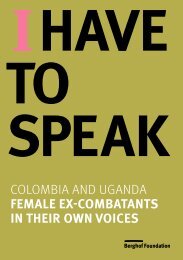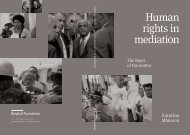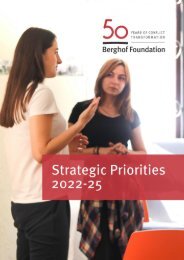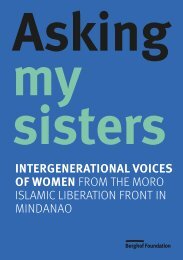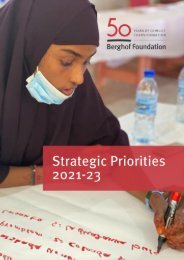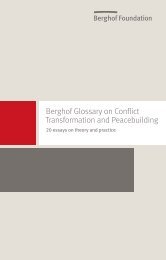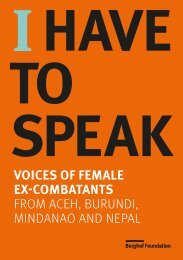Berghof Foundation: 50 years of conflict transformation
This book provides an overview of the Berghof Foundation’s work and impact over the past 50 years and sheds light on the challenges ahead of peacebuilding.
This book provides an overview of the Berghof Foundation’s work and impact over the past 50 years and sheds light on the challenges ahead of peacebuilding.
You also want an ePaper? Increase the reach of your titles
YUMPU automatically turns print PDFs into web optimized ePapers that Google loves.
Peace education<br />
goes online<br />
Learning spaces<br />
and material for<br />
young people<br />
The increasing importance and constant expansion<br />
<strong>of</strong> the internet since the late 1990s have resulted in<br />
new, as yet almost untested digital approaches to<br />
teaching peace education. The peace educators at<br />
the <strong>Bergh<strong>of</strong></strong> <strong>Foundation</strong> recognised this potential as<br />
early as 2005 and initiated several digital projects.<br />
Having observed and experienced ourselves how<br />
children ask questions about war and peace, violence<br />
and <strong>conflict</strong>, we launched the online platform friedenfragen.de.<br />
This platform is still in existence, providing<br />
child-friendly answers to children’s questions about<br />
how we live and interact together. All our answers<br />
are individual, reflect current academic thinking, and<br />
are based on values such as peace, human rights<br />
and non-violence. We use stories, maps, cartoons<br />
and videos, and enable children to reflect their<br />
personal views through quizzes. Parents, teachers<br />
and educators in childcare facilities can also find<br />
educational support on how to deal with children’s<br />
questions, fears or media consumption.<br />
While the frieden-fragen.de website has become<br />
established over the <strong>years</strong>, digitalisation has<br />
progressed rapidly. It now permeates almost<br />
all spheres <strong>of</strong> society, and influences how we<br />
communicate with each other, consume news, argue,<br />
search for and access information, or find guidance.<br />
In addition to numerous advantages, this has brought<br />
new challenges for peaceful social relations.<br />
2005–present<br />
Nowadays, the use <strong>of</strong> smartphones gives children<br />
and teenagers almost unlimited access to online<br />
platforms and thus to a flood <strong>of</strong> information, which<br />
has a significant effect on their identity formation.<br />
The unprecedented speed <strong>of</strong> communication, the<br />
dwindling role <strong>of</strong> journalists as gatekeepers and<br />
the interactivity <strong>of</strong> Web 2.0, where anyone and<br />
everyone can become a transmitter <strong>of</strong> information,<br />
all contribute to an unprecedented availability<br />
<strong>of</strong> information, some <strong>of</strong> which in turn fosters the<br />
spread <strong>of</strong> disinformation, propaganda and hate<br />
speech. As a consequence <strong>of</strong> these developments,<br />
we have seen increasing uncertainty among<br />
children and teenagers, especially with regard to<br />
current political events. Media coverage <strong>of</strong> war,<br />
terrorism, violence and oppression fuel fears,<br />
especially if the events are not contextualised.<br />
For young people it is sometimes difficult<br />
to distinguish between rumours and facts in the<br />
media they consume online. Again and again,<br />
the questions we received via frieden-fragen.de<br />
referred to sites promoting disinformation, asking<br />
whether they were really telling the truth. Children<br />
and young people also come across alleged news<br />
in social networks and messaging services, such<br />
as the announcement <strong>of</strong> a third world war or the<br />
destruction <strong>of</strong> the world through nuclear weapons.<br />
This further reinforces fears and insecurities, which<br />
extremists can then use for their own purposes.<br />
They reinforce polarisation, try to influence media<br />
agendas and can even encourage radicalisation.<br />
This experience was also the impetus<br />
for our project Culture <strong>of</strong> Conflict 3.0 — Learning<br />
spaces and media for young people to deal<br />
with internet violence and hatred, which we<br />
implemented from 2017 until 2019. Now it was<br />
no longer just about conveying peace education<br />
content through digital learning media, but about<br />
specifically dealing with digital media themselves.<br />
The project thus aimed to raise young people’s<br />
awareness <strong>of</strong> hate and disinformation online,<br />
to strengthen their critical media skills and<br />
to encourage them to stand up for peaceful<br />
social relations on the internet. This also<br />
involves experiencing the internet as a positive<br />
creative space.<br />
The Culture <strong>of</strong> Conflict 3.0 app creates<br />
learning spaces for young people to share their<br />
experiences <strong>of</strong> discrimination, hate speech and<br />
digital violence. They are encouraged to become<br />
active themselves, or to use digital tools for their<br />
involvement. In view <strong>of</strong> the hatred, anti-democratic<br />
tone and violence in the digital landscape, it is<br />
important to work for peaceful social relations<br />
and to continue to build and strengthen a digital<br />
civil society. Against the background <strong>of</strong> rapidly<br />
spreading conspiracy theories — especially during<br />
the coronavirus pandemic — peace educators<br />
are now once again faced with the challenge <strong>of</strong><br />
facilitating innovative, target group-specific<br />
approaches to these topics.<br />
Based on the experience gained with our<br />
project Culture <strong>of</strong> Conflict 3.0 and the response<br />
to the diverse needs in dealing with digital antidemocratic<br />
trends in academic and non-academic<br />
education, we have developed the pilot project<br />
#vrschwrng (conspiracy) — an interactive toolkit<br />
against conspiracy theories. Through a dialogueoriented,<br />
participatory process, which will last<br />
from 2020 to 2024, we will develop educational<br />
material together with young people with the aim<br />
<strong>of</strong> strengthening their knowledge and critical<br />
skills in dealing with conspiracy theories. This free<br />
interactive toolkit will be published on the platform<br />
vrschwrng.de in 2021.<br />
106<br />
107




